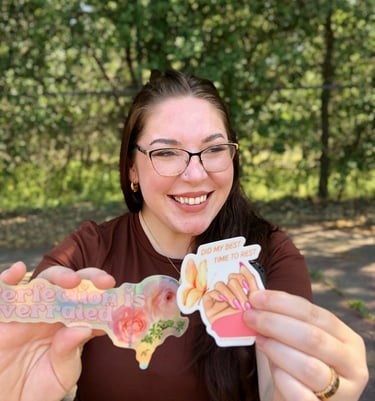💛 Earn rewards when you refer a friend - learn more here

Mothering What Matters: From Kids to Kitchens to Our Inner Selves
10/3/20254 min read


When you hear the word mothering, your brain probably goes straight to kids, right? Lunch boxes, bedtime stories, Target runs for soccer cleats you swore you bought last week. But here’s the thing: mothering isn’t just about raising children. It’s about nurturing. And we all mother something—whether it’s people, pets, plants, or even the quiet corners of our own hearts.
Lately, I’ve been sitting with this phrase: mother what matters. It feels like both an invitation and a reminder. Because no matter what “motherhood” looks like for you (or even if you don’t identify with that word at all), chances are you’re already mothering in more ways than you realize. And the way you mother—how you show up with patience, love, and forgiveness—shapes not just your home, but also your healing.
Let’s unpack this together.
Part 1: Mothering Our Children (or Whoever Depends on Us)
The most obvious version of mothering is the literal one: caring for children. It’s making sure they’re fed, clothed, hugged, and guided through the ups and downs of life. But it’s also knowing that we don’t have to get it perfect to be good mothers.
One powerful truth that often gets overlooked: studies show that trauma in childhood isn’t about the circumstances alone—it’s about whether a child felt supported or alone during them. That’s something within our control. Our presence, empathy, and willingness to walk through hard things with our kids matter more than whether we can prevent every hard thing.
Kids don’t need a flawless parent—they need a safe one. They need someone who shows them it’s okay to make mistakes, to rest, to start again. That’s where self-love and forgiveness slip into the picture: when we model grace with ourselves, they learn how to give grace to themselves too.
And if you don’t have kids? Maybe you’re pouring that same energy into your nieces, nephews, godchildren, or the students in your classroom. That counts. That is mothering.
Part 2: Nurturing Our Homes, Pets, and Plants
Nurturing doesn’t stop with people—it spills into the spaces and beings we care for. Every time you refill the dog’s water bowl, water your snake plant, or finally deal with the kitchen junk drawer that has been giving you side-eye for weeks, you’re nurturing.
Here’s where it gets fun: nurturing your home is less about doing more chores and more about caring for the environment that cares for you back. When we tidy a little corner, light a candle, or make a cozy space to collapse at the end of the day, we’re saying: this matters.
Think about it: pets feel our energy, plants respond to our care, and our homes either support our nervous system or overwhelm it. Nurturing our environment is one of the most overlooked forms of self-love—but it might be the most transformative.
Part 3: Mothering Our Inner Child
Now here’s where it gets really tender. We all carry an inner child—the version of us who once needed love, safety, and validation. But that inner child isn’t only about wounds. It’s also the most authentic, unbiased, joyous, innocent version of ourselves—the part that still lights up at simple pleasures, that believes in magic, that hasn’t learned to judge or edit themselves yet.
Mothering our inner child looks like taking the abstract idea of self-love and making it literal:
Catching negative self-talk mid-sentence and shifting it into kindness. (“Wow, I’m so lazy” becomes “Actually, I’m tired—and that’s okay.”)
Placing a hand on your heart or giving yourself a quick hug when you feel shame or overwhelm, whispering, “I’m sorry you feel this way. I’m here now.”
Building in little rituals of delight—like buying yourself a fun snack, coloring, or putting on music you loved as a kid—just because that inner child deserves joy.
Forgiving yourself for the past as often as needed. Every time you stumble is another chance to practice.
These small, almost silly-seeming acts are actually powerful ways to re-parent yourself. They tell your nervous system: you’re not alone anymore. And that safety? It ripples into every part of your life.
So, What Really Matters?
Whether you’re tucking in your kids, watering your monstera, organizing your pantry, or rewriting old stories for your inner child—the common thread is love. Not rigid, exhausting, performative love. But forgiving, gentle, real love.
To mother what matters is to ask:
✨ What in my life deserves my energy right now?
✨ What am I nurturing that also nurtures me?
✨ Where can I show up softer, not harder?
The truth is, mothering isn’t about being endlessly selfless—it’s about tending to the things (and people, and creatures, and spaces) that give life meaning. And when we do that, we accidentally mother ourselves back into wholeness, too.
Final Thoughts
Mothering what matters doesn’t mean doing it all. It doesn’t mean keeping the house spotless, kids happy 24/7, pets perfectly groomed, and your inner child on a permanent healing retreat.
It means choosing. Choosing what gets your care. Choosing to forgive yourself for what doesn’t. Choosing to treat your home as an ally instead of an enemy. Choosing to give yourself the same softness you give everyone else.
And maybe—just maybe—it means noticing that every time you pick up that broom, hug that kid, water that fern, or pause to breathe, you’re not just keeping things alive—you’re creating peace.

🌿 About the Author
Hi, I’m Jocelyn—the heart behind Tidy On Your Terms. I help people create home systems rooted in self-love, not shame. My work blends cleaning and organizing with nervous system support, forgiveness, and flexibility—because your space should feel like peace, not pressure.
📖 Bring Encouragement Into Your Home
Looking to bring some encouragement into your space?
Check out the paperback Tidy On Your Terms here—a soft, supportive introduction to our approach.




